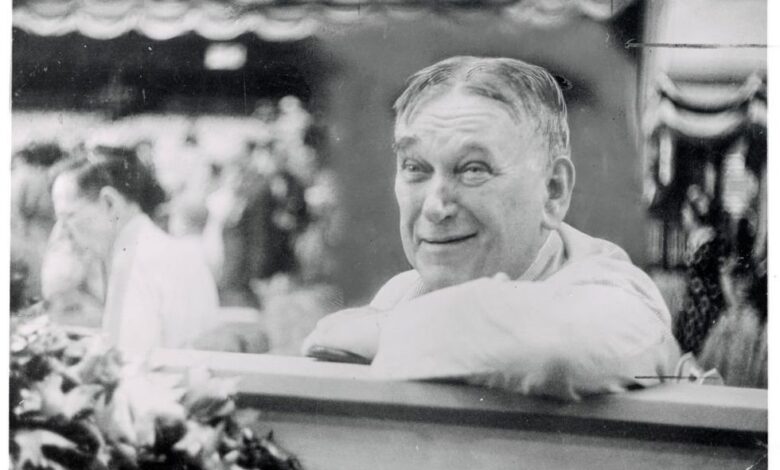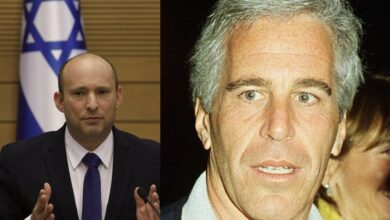Mencken on democracy: Politicians prey on public fear

With the wild debate between Joe Biden and Donald Trump remaining a lively topic of conversation and the U.S. Supreme Court handing down landmark decisions on free speech, the administrative state, and presidential immunity, these are contentious and confusing times. So I decided to hang out with H.L. Mencken and solicit his opinions.
Why Mencken? Easy. He was an iconoclast. Funny, perceptive, irreverent, insightful. An experienced journalist during a period that could be deemed the golden age of journalism. An essayist. A cultural critic. Humorous. Caustic. Combative. And an authority on language. Exactly the type of person I enjoy hanging out with, conversing with, and listening to.
Under democracy, one party always devotes its chief energies to trying to prove that the other party is unfit to rule — and both commonly succeed and are right.
Mencken (1880-1956) was also known as the Sage of Baltimore. He was so influential that even Ernest Hemingway made mention of him in “The Sun Also Rises” when the main protagonist, Jake Barnes, says, “So many young men get their likes and dislikes from Mencken.” Maybe, after reading Mencken’s answers to my questions, you will too. I suggest reading his “Notes on Democracy” and “The American Language.”
Jeffrey Wernick: Mr. Mencken, any comments regarding the presidential debate?
H.L. Mencken: On some great and glorious day, the plain folks of the land will reach their heart’s desire at last, and the White House will be adorned by a downright moron.
JW: And what is your opinion of Joe Biden and Donald Trump?
HLM: The whole aim of practical politics is to keep the populace alarmed — and hence clamorous to be led to safety — by menacing it with an endless series of hobgoblins, all of them imaginary. The demagogue is one who preaches doctrines he knows to be untrue to men he knows to be idiots.
JW: But do you not think there is a moral difference in the qualities of the two candidates?
HLM: People do not expect to find chastity in a whorehouse. Why, then, do they expect to find honesty and humanity in government, a congeries of institutions whose modus operandi consists of lying, cheating, stealing, and, if need be, murdering those who resist?
JW: Do you believe that one candidate vis-à-vis the other represents a greater threat to democracy?
HLM: Under democracy, one party always devotes its chief energies to trying to prove that the other party is unfit to rule — and both commonly succeed and are right. One of the main purposes of laws in a democratic society is to put burdens upon intelligence and reduce it to impotence. The ideal government of all reflective men, from Aristotle onward, is one which lets the individual alone — one which barely escapes being no government at all.
JW: Donald Trump believes that to save America, to make America great again, requires the adoption and implementation of his ideas or America has no future. What do you think?
HLM: The kind of man who demands that government enforce his ideas is always the kind whose ideas are idiotic.
A judge is a law student who marks his own examination papers.
JW: Joe Biden refers to his own decency as an important reason why people should vote for him. Do you agree?
HLM: Every decent man is ashamed of the government he lives under. Whenever “A” attempts by law to impose his moral standards upon “B,” “A” is most likely a scoundrel.
JW: What did you think about the golf challenge each of them made to the other?
HLM: If I had my way, any man guilty of golf would be ineligible for any office of trust in the United States.
JW: Do you think that speech not moderated by platforms represents an existential threat to democracy?
HLM: I believe that it should be perfectly lawful to print even things that outrage the pruderies and prejudices of the general, so long as any honest minority, however small, wants to read them. The remedy of the majority is not prohibition, but avoidance.
JW: After reviewing the Supreme Court’s last batch of opinions, what do you have to say?
HLM: Probably the worst thing that has happened in America in my time is the decay of confidence in the courts. No one can be sure any more that in a given case they will uphold the plainest mandate of the Constitution. On the contrary, everyone begins to be more or less convinced in advance that they won’t. Judges are chosen not because they know the Constitution and are in favor of it, but precisely because they appear to be against it. A judge is a law student who marks his own examination papers.
JW: Many people ask who represents the greatest threat to democracy and rule of law. I have a different question: Who represents the greatest threat to the state?
HLM: The most dangerous man to any government is the man who is able to think things out … without regard to the prevailing superstitions and taboos. Almost inevitably he comes to the conclusion that the government he lives under is dishonest, insane, intolerable.
JW: Do you think limited government where the objective function of the state is to preserve individual liberty and freedom is possible?
HLM: The average man’s love of liberty is nine-tenths imaginary, exactly like his love of sense, justice and truth. … It takes a special sort of man to understand and enjoy liberty — and he is usually an outlaw in democratic societies. There has been no organized effort to keep government down since Jefferson’s day. Ever since then the American people have been bolstering up its powers and giving it more and more jurisdiction over their affairs. They pay for that folly in increased taxes and diminished liberties. Ostensibly, their aim is to penalize anti-social acts; actually their aim is to penalize heretical opinions. At least 95 Americans out of every 100 believe that this process is honest and even laudable; it is practically impossible to convince them that there is anything evil in it. In other words, they cannot grasp the concept of liberty.
If a politician found he had cannibals among his constituents, he would promise them missionaries for dinner.
JW: With respect to taxation, spending, and the role of government in society, its appropriate size, scale, and scope, how would you describe the candidates’ positions?
HLM: When a private citizen is robbed, a worthy man is deprived of the fruits of his industry and thrift; when the government is robbed, the worst that happens is that certain rogues and loafers have less money to play with than they had before. The government consists of a gang of men exactly like you and me. They have, taking one with another, no special talent for the business of government; they have only a talent for getting and holding office. Their principal device to that end is to search out groups who pant and pine for something they can’t get and to promise to give it to them. Nine times out of 10 that promise is worth nothing. The tenth time is made good by looting A to satisfy B. In other words, government is a broker in pillage, and every election is sort of an advance auction sale of stolen goods.
JW: What, in your opinion, are the attributes of a successful candidate?
HLM: When a candidate for public office faces the voters, he does not face men of sense; he faces a mob of men whose chief distinguishing mark is the fact that they are quite incapable of weighing ideas, or even of comprehending any save the most elemental — men whose whole thinking is done in terms of emotion, and whose dominant emotion is dread of what they cannot understand. So confronted, the candidate must either bark with the pack or be lost. … All the odds are on the man who is, intrinsically, the most devious and mediocre. If a politician found he had cannibals among his constituents, he would promise them missionaries for dinner.
JW: Which conspiracy theories do you find most credible?
HLM: The central belief of every moron is that he is the victim of a mysterious conspiracy against his common rights and true deserts.
JW: Finally — and thank you for the time and conversation and patience with my questions — who do you plan on voting for?
HLM: There’s really no point to voting. If it made any difference, it would probably be illegal.




